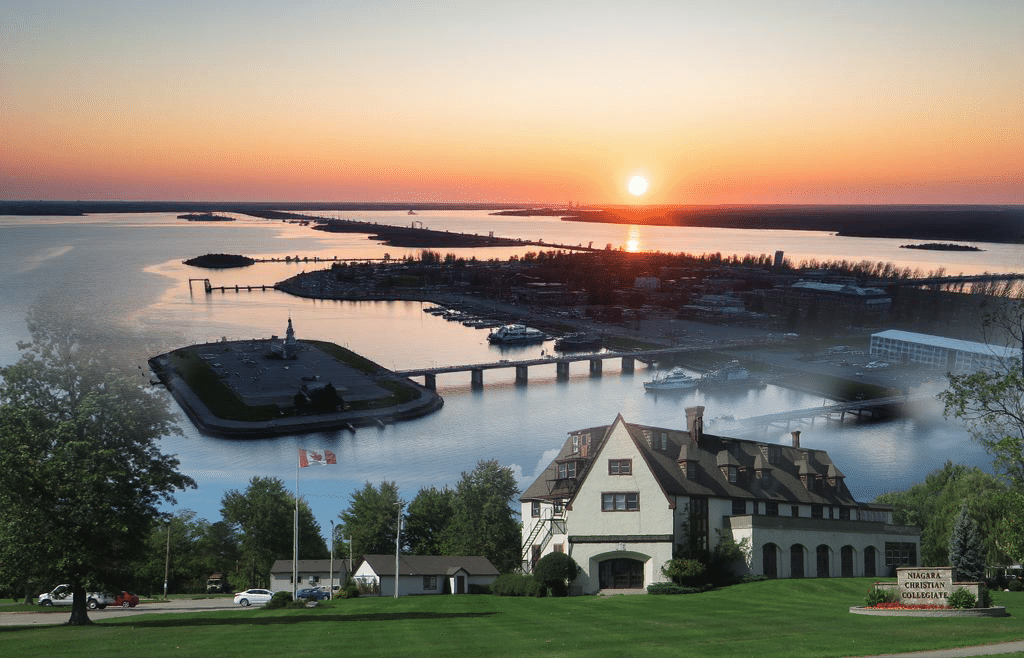If you’ve ever dreamed of living in a place that offers the charm of a small town, the proximity to nature, and the conveniences of a connected lifestyle, Fort Erie may already be on your radar. Tucked away along the Niagara River, just a short drive from the Greater Toronto Area, Fort Erie is quickly becoming one of Southern Ontario’s most desirable places to live—especially for families, retirees, and professionals seeking peaceful, meaningful living.
Whether you’re already in the area or just beginning to explore what life in Fort Erie could offer, here’s a full guide to 10 relaxing and family-friendly things to do near Fort Erie this year.
1. Spend the Day at Crystal Beach
Crystal Beach is Fort Erie’s summer sweetheart. With soft sand, turquoise water, and a welcoming boardwalk, it’s the kind of place that makes you want to stay a little longer. Families often spend the entire day here building sandcastles, swimming, or trying out local food vendors like San Vito’s or the Palmwood.
It’s not just for tourists—locals love that this pristine beach is never too far from home.
2. Visit Old Fort Erie and Dive into History
History buffs and curious kids alike will enjoy Old Fort Erie, a site that played a crucial role during the War of 1812. Interactive reenactments, guided tours, and riverside scenery bring Canadian history to life.
Imagine living just minutes away from a national landmark—where your children can learn from the past while building their future.
3. Walk or Cycle the Niagara River Recreation Trail
This 56-km multi-use path runs along the stunning Niagara River and passes through Fort Erie. Whether you’re biking, jogging, or strolling, the path offers scenic views, shaded rest stops, and picnic areas. It’s also dog-friendly and perfect for weekend family outings.
The best part? This kind of nature access doesn’t require a vacation—it’s your backyard.
4. Waverly Beach Park: A Hidden Gem
While Crystal Beach often gets the spotlight, Waverly Beach Park is a quieter retreat with open spaces, shaded walking paths, and breathtaking lakefront views. It also has a children’s splash pad, making it a hit with young families.
For those who value daily moments of calm, Waverly Beach is an everyday luxury.
5. Explore Ridgeway’s Local Culture
Just 10 minutes from central Fort Erie, Ridgeway is a charming village with big personality. Its historic main street is lined with boutiques, cafes, vintage shops, and a bustling farmers market every Saturday.
Locals love brunch at the Kitchen by Matt Dean Pettit or browsing handmade goods at the Ridge Film House artisan market. The village vibe is authentic and community-focused—a perfect weekend getaway or a permanent lifestyle shift.
6. Tour Niagara’s Underrated Wineries
You don’t have to drive all the way to Niagara-on-the-Lake to experience wine country. Fort Erie is increasingly surrounded by boutique vineyards and family-run wineries offering tastings, pairings, and even farm-to-table dinners.
In a post-pandemic world, people are looking for slower, more intentional living—and Fort Erie delivers.
7. Kayak or Fish Along the Niagara River
Fort Erie offers direct access to the Upper Niagara River, a paradise for kayaking, paddleboarding, and fishing. Whether you want to rent equipment or join a local guided tour, this region is perfect for those who thrive in the outdoors.
It’s especially ideal for families wanting to disconnect from screens and reconnect with nature.
8. Discover Local Events and Summer Festivals
From the Friendship Festival to Art by the Market, Fort Erie celebrates community all year long. These events are small enough to feel local but large enough to offer food trucks, live music, crafts, and plenty of activities for kids.
Buying a home here means becoming part of something—something real.
9. Day Trip to Niagara Falls (Without the Noise)
One of Fort Erie’s biggest lifestyle perks? You’re just 20–25 minutes from Niagara Falls, one of the world’s most famous attractions—but far enough to enjoy peace and quiet at home.
Take a weekend to explore Clifton Hill, dine with a view of the Falls, or take the kids on the Niagara SkyWheel. Then head back home to the calm of Fort Erie.
10. Catch a Sunset You’ll Never Forget
Whether from your porch, the waterfront trail, or a scenic lookout, Fort Erie sunsets are spectacular. This natural beauty—paired with the slower rhythm of the town—has made the area especially popular with young families and GTA transplants looking to escape city pressure.
It’s not just a weekend destination—it’s a lifestyle.
🏡 Why Fort Erie Is on the Radar in 2025
Fort Erie is no longer a secret.
In recent years, a growing number of buyers from Mississauga, Brampton, and even downtown Toronto have turned their attention toward Niagara South. And for good reason:
-
Housing is more affordable than the GTA
-
Highway and border access make commuting or business travel easy
-
Remote work flexibility means you don’t need to sacrifice career for calm
-
The rise of mixed-use communities makes daily life walkable and vibrant
With new infrastructure projects, walkable developments, and interest from young families and investors alike, Fort Erie is poised for responsible growth—without losing its soul.
🧭 The Team Arora Perspective
At Team Arora, we’ve helped hundreds of families transition from fast-paced city life to more peaceful living—without giving up access, opportunity, or community.
If Fort Erie speaks to your vision of home, our local insight and commitment can help guide you, whether you’re searching for a family home, a lakeside retreat, or a long-term investment.
Explore our current listings or contact us for personalized guidance—we’ll help you find not just a property, but a place to thrive.
❓ FAQs About Living Near Fort Erie
1. Is Fort Erie a good place to raise a family?
Absolutely. Fort Erie offers a family-first environment with great schools, safe neighborhoods, and abundant outdoor space. The pace of life is slower compared to larger cities, giving children more room to play and parents a stronger sense of community. Many parks, recreational centers, and youth programs make it easy to stay engaged without the stress of heavy traffic or urban noise.
2. How far is Fort Erie from major cities like Toronto or Mississauga?
Fort Erie is approximately 1 hour 30 minutes from Mississauga and around 1 hour 45 minutes from downtown Toronto, depending on traffic. Its location along the QEW and proximity to the U.S. border via the Peace Bridge also make it ideal for both commuting and weekend getaways.
For remote workers, this means enjoying a quieter lifestyle without sacrificing access to big-city amenities.
3. What kind of real estate is available in Fort Erie?
Fort Erie offers a variety of housing options—from single-family homes and modern townhomes to larger properties near the waterfront. There are also new pre-construction developments that blend residential living with walkable shopping and recreational areas. These communities appeal to both investors and homebuyers looking for long-term value and lifestyle benefits.
4. Is Fort Erie only a summer destination?
While Fort Erie shines in the summer, it’s truly a four-season town. Fall brings vibrant foliage and wine festivals, winter offers ice skating and cozy community events, and spring is filled with farmers markets and riverside walks. Its year-round livability is one reason why more people are choosing it as a permanent home rather than a seasonal retreat.
5. Is real estate in Fort Erie a good investment in 2025?
Yes. With rising prices across the GTA, Fort Erie presents an affordable entry point with strong potential for appreciation. Infrastructure upgrades, new community developments, and increasing interest from out-of-town buyers are driving demand. As more families and professionals look for quieter, more connected living, Fort Erie stands out as both a lifestyle upgrade and a smart investment.








